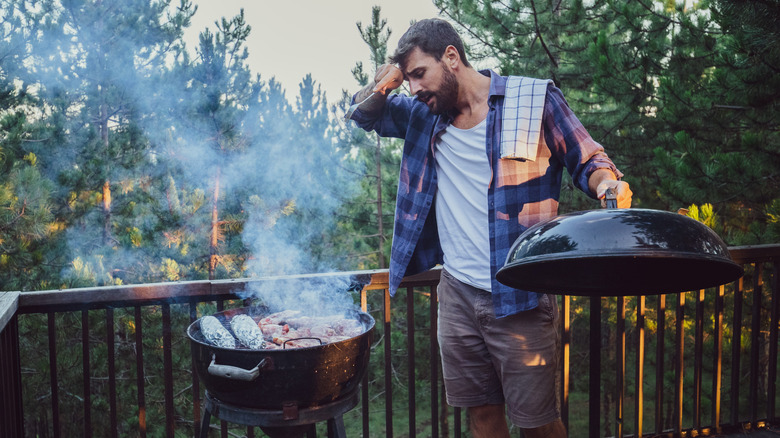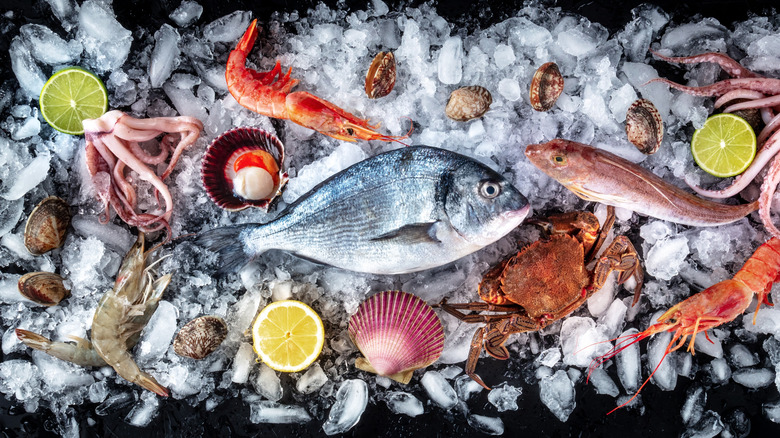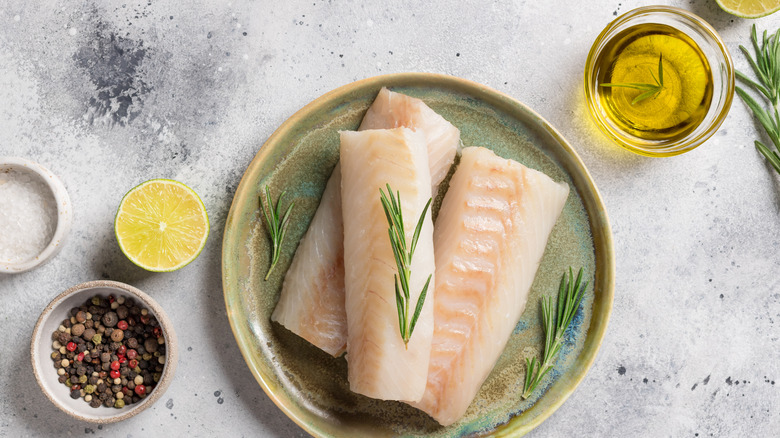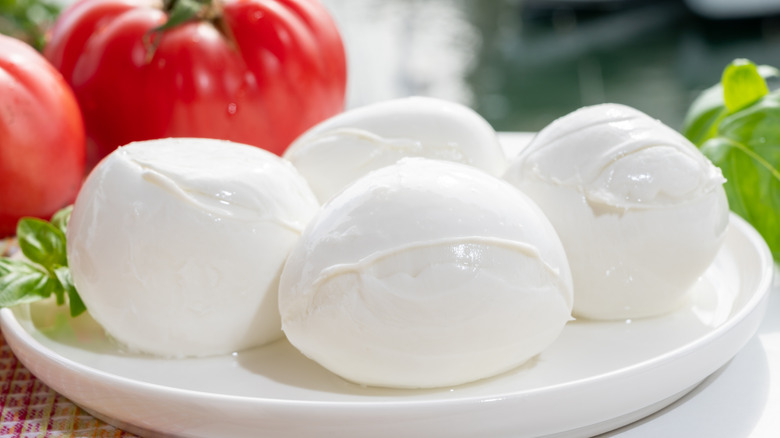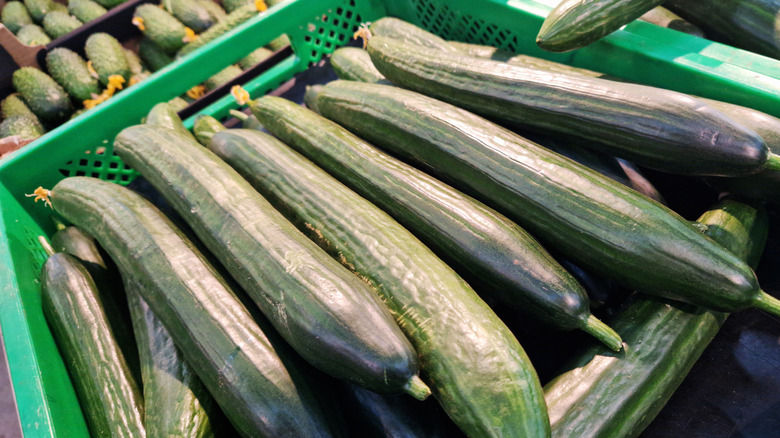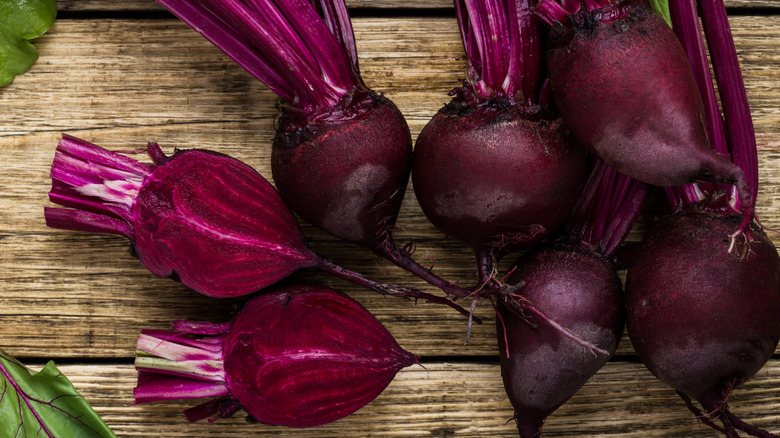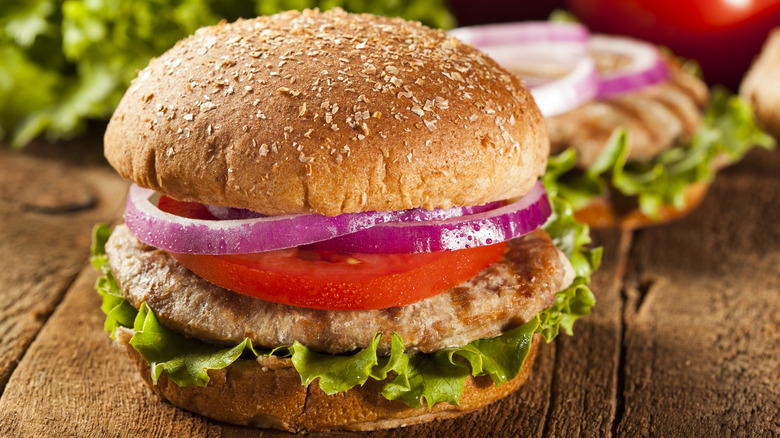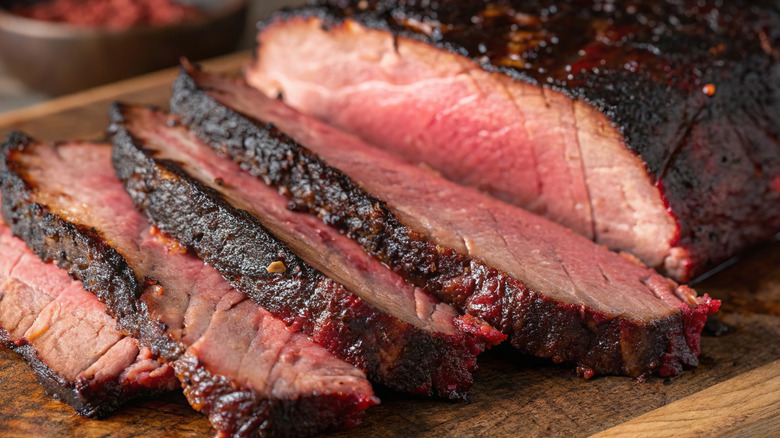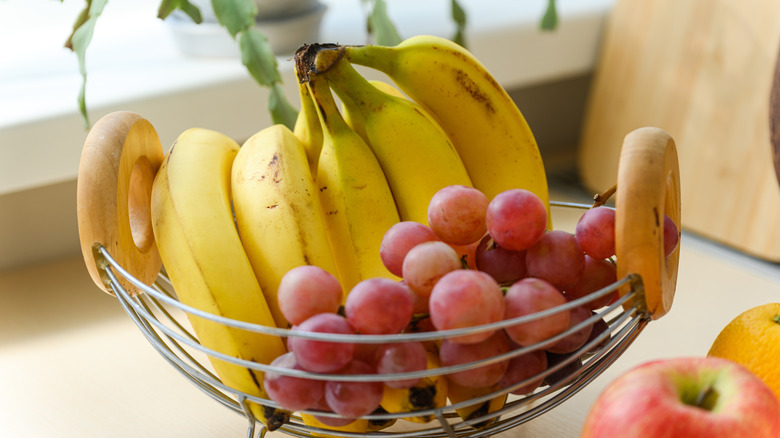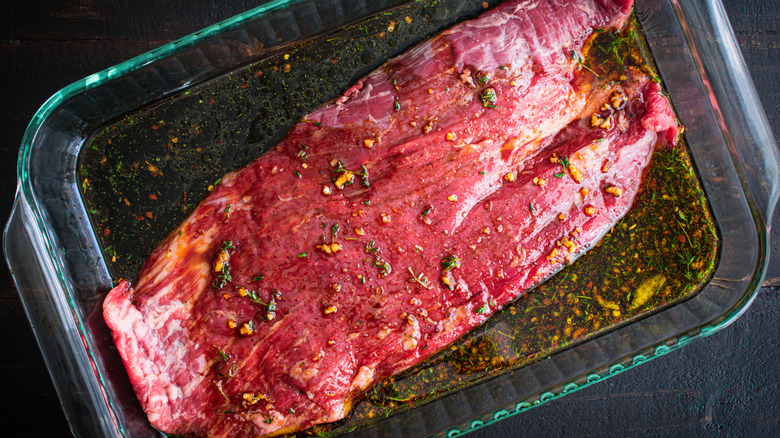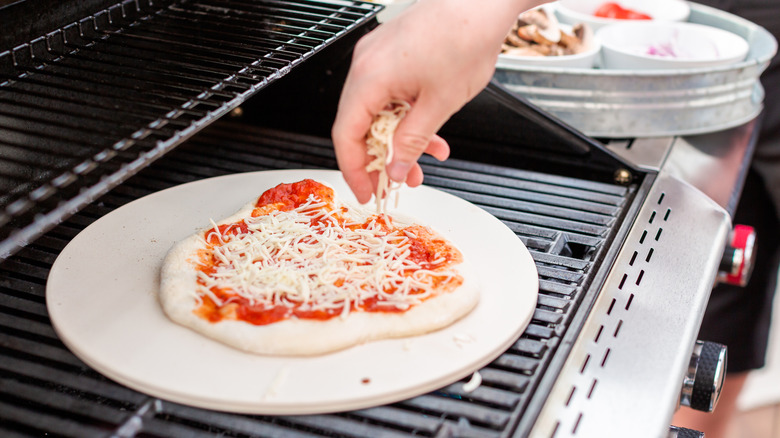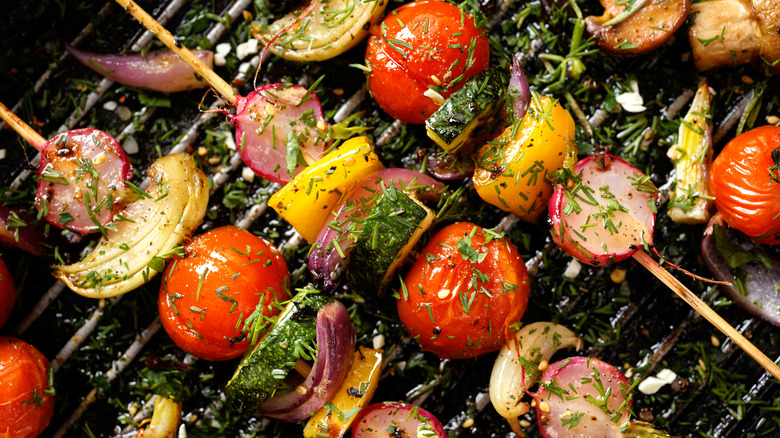11 Foods You Should Never Cook On The Grill
We may receive a commission on purchases made from links.
One of many exciting warm-weather rituals is firing up the grill again after a long winter. Even a basic hamburger tastes like heaven when you get to enjoy the sunshine and delicious aromas as your meat cooks alfresco.
While you may be tempted to cook a bunch of your meals on the grill these days, there are some ingredients that you're better off cooking elsewhere. Instead of ending up with a big mess on your grill or an inedible pile of food, let grilling experts steer you away from a potential disaster.
Would you like to know which foods you should never cook on the grill? To learn all about what items aren't worth barbecuing, we spoke with global grilling authority and TV host Steven Raichlen from Barbecue Bible, Maciek Zurawski from Grillin With Dad, and Mike Lukoskie, a sales representative from Charlotte Grill Company. Read on to uncover these ingredients and learn about the tools and techniques recommended to make grilling simpler.
Frozen seafood and tiny shellfish
Freezing meat and seafood is the easiest way to keep these ingredients fresh for long periods of time — but there's nothing more frustrating than coming home hungry and realizing that you've forgotten to take out a frozen item to thaw in the fridge. You may be tempted to just throw frozen fish on the grill and hope for the best, but Mike Lukoskie from Charlotte Grill Company doesn't recommend it. "You don't want to grill seafood when frozen, as the moisture from the thawing can affect the evenness of the cook," he says.
Additionally, it's always wise to keep tiny shellfish away from the barbecue, such as baby scallops and small shrimp, according to Maciek Zurawski from Grillin With Dad. Due to the diminutive size of these seafood varieties, "they can slip through the grates or overcook in seconds," he warns. If you're craving shrimp on the barbie, it's best to arrange them tightly on a skewer, which makes them easy to flip and sear without overcooking.
Flaky fish, such as cod and flounder
All three of the grilling experts we consulted agreed that flaky fish should be a no-go when it comes to grilling. This includes cod, tilapia, flounder, lemon sole, and other cuts of flaky white fish. If you try to grill these delicate types of fish, you'll watch them fall apart as they stick to the grates or fall.
There are a few different tools that you can use to effectively grill flaky fish, according to the experts. Steven Raichlen says that you can barbecue them by using a plancha or griddle, while Maciek Zurawski suggests "using a grill basket or wrapping them in foil." If you are not feeling confident enough to experiment with these tools, all you need is some brioche to try the mouthwatering hack for crispy fish baked in the oven. You can also stick with grilling heartier fish, such as salmon, tuna, or snapper.
If you're not sure about how to approach barbecuing fish and other types of meat, Raichlen's many years of grilling experience taught him this: "Direct-grill intrinsically tender, quick-cooking meats, like steaks, burgers, fish fillets, and chicken breasts. Indirect grill or smoke larger or tougher cuts of meat, like prime rib, whole fish, and whole chicken."
Soft or processed cheeses
Once you've tried smoked Gouda or Gruyère, your taste buds will always be on the hunt for cheeses that fit the smoky, rich, salty, and creamy flavor profile. Grilling cheese can be a fantastic idea, but you have to be picky when you're grocery shopping for it.
Mike Lukoskie enjoys grilling cheeses that have a husk or rind, such as Brie, pecorino Romano, or Camembert — but you are only limited by the grilling tools at your disposal. "On a flat top, you can do whatever you like," Lukoskie says, adding that he prefers bolder cheeses like Gouda, Provolone, and sharp cheddar, "as they benefit from the smokier flavor."
Meanwhile, Steven Raichlen loves halloumi from Cyprus, because it "won't melt when exposed to the high heat of the grill." And Maciek Zurawski says that "paneer is a top pick — it's firm, won't melt easily, and gets a nice sear."
As for which cheeses you should avoid, the experts say that anything soft could be disastrous. "Soft cheeses like Brie, Camembert, or mozzarella will turn into a puddle unless you grill them inside something, like a sandwich or foil packet," Zurawski advises. Raichlen also notes that "processed cheeses, like American cheese and Velveeta, are not good for grilling; they'll melt through the bars of the grill onto the fire."
Leafy greens, cucumbers, celery, and other watery vegetables
Vegetables tend to be a lot more enticing with a nice sear from the grill. The great news is that our experts agreed that you can throw caution to the wind when grilling many vegetables. The only ones that didn't get a green light from the experts are vegetables with a very high water content.
While it's not impossible to grill watery veggies like cucumber and celery, the taste won't win you over. "Cucumbers lose a lot of moisture (and flavor) on the grill, and are not commonly included in grilled veggie dishes," says Mike Lukoskie. Instead, you may want to use your fresh cucumbers in a homemade tzatziki sauce recipe that would pair well with grilled kebabs.
Maciek Zurawski agrees, adding that "very watery veggies like cucumbers or celery don't grill well — they lose structure and don't develop much flavor. Instead, stick with hearty veggies like bell peppers, zucchini, and asparagus." He also thinks you'll be disappointed if you try to grill any leafy greens, like spinach or arugula, since they'll immediately wilt and get bitter. "Swap leafy greens for grilled romaine halves," Zurawski suggests.
Hard root vegetables, such as beets and rutabagas
Steven Raichlen is a huge fan of throwing all kinds of vegetables on the grill. "It's hard to think of a vegetable that's not good for grilling. High-moisture vegetables — like corn, onions, bell peppers, and mushrooms — do great direct-grilled," he says.
While Raichlen couldn't come up with any vegetables that home cooks should avoid grilling outright, he thinks that hard root vegetables require a specific approach to be cooked properly. "Hard root vegetables, like beets and rutabagas, aren't so great direct-grilled, but you can indirect-grill or ember-grill them with reasonable results."
Putting in that effort for only "reasonable results" may not always be worthwhile, but that technique is your best bet if you're passionate about trying. But keep in mind that roasting is likely the easiest and most delicious cooking method for hard root vegetables. If you'd like to serve those veggies at your next barbecue, roasting them in the oven can free up some grill space, and will require less work.
Super-lean ground meats, like turkey and chicken, fare better with a binder
If you're searching for the perfect fat ratio for your burgers, 80/20 is the grilling experts' top pick. There isn't any type of ground meat that these three would avoid, but Mike Lukoskie and Maciek Zurawski urge home cooks to use a binder agent like egg or cheese to make ground poultry burgers better.
Lukoskie explains that if binders are used in ground turkey or chicken patties, this will "keep them together as they grill and the fat renders out." He prefers using beaten eggs for a binding agent, as they hold the meat together while helping the patty grow bigger and fluffier. Lukoskie also likes adding bacon, cheese, jalapeños, onion, bell pepper, and garlic to make patties more flavorful and dense, while Zurawski has a preference for "add-ins like grated onion, Worcestershire, or a bit of mayo."
Some home cooks experiment with stuffing cheese inside their burger patties to get a gooey, melted pocket. Steven Raichlen takes things further with a dish he calls the "inside-out cheeseburger." To make this, he advises that you "don't melt the cheese on top of the burger; coarsely grate it and fold it into the burger meat. It will melt as the burger cooks, keeping the meat moist and tender — even when you grill it to a safe internal temperature of 160 degrees Fahrenheit."
Approach brisket and other big cuts of meat with caution
The experts emphasize that big cuts of beef shouldn't get much direct heat. You should always approach brisket, prime rib, and beef shank using a low-and-slow method. Steven Raichlen's advice for grilling tough meats is inspired by a Philadelphia specialty sandwich. "One secret to making any tough meat — grilled or smoked — palatable is to slice it paper-thin across the grain. That's how Philadelphians achieve tenderness in their namesake cheesesteaks," he shares.
Mike Lukoskie thinks that home cooks should enjoy the best of both worlds by using the grill and oven when preparing sizable cuts of meat. "Prime rib, brisket, roasts, and tenderloins may need to be finished in the oven after the initial sear to avoid overcooking, but almost all beef is going to go really well on the grill as long as you monitor and manage the internal temperature," he says.
When barbecuing, do you struggle to keep your grilled meat juicy? Lukoskie has some advice about that, too, when cooking big pieces of meat on the grill. "You could try brining or marinating them to help them stay moist and flavorful, and avoid getting overcooked," he suggests, while adding that letting meats get to room temperature before grilling helps them cook more evenly.
Don't forget to practice some patience once it's time to take your meat off the grill. Some meats only need around five minutes of resting time, while bigger cuts may need considerably more time.
Several types of fruit may not turn out great on the grill
Grilling fruit can transform the natural sugars of these healthy treats in a magical way, and many types of fruit will taste fabulous after being barbecued. However, the experts say it's best to keep watery fruits off the grill — like kiwis and oranges — since they can get rather mushy over time.
Grilling watermelon can seem like the ultimate encapsulation of summer, but Maciek Zurawski has fallen for this trap and recommends avoiding it. "Watermelon might seem like a good idea, but it often ends up mushy and watery after grilling. Same with overly ripe bananas — they just turn to mush and can get messy," he says.
It is still possible to barbecue bananas, as long as you keep a close eye on them. If they get too soft, you won't achieve any caramelization on the grill. Keeping your bananas in their peels while they're on the grates could prevent a mess. Alternatively, you can try making foil-wrapped grilled stuffed banana boats to get that fire-infused flavor without the hassle.
To get the most delicious grilled fruit, Steven Raichlen advises placing watery fruits like peaches and pineapple over direct heat, while firmer fruits like apples and pears should be placed over indirect heat. However, Raichlen notes that "one fruit I don't particularly like grilled (or heated in any way) is grapes," which are likely to fall between the grates of a barbecue, anyway.
Tempura and marinades with a high oil, lard, or sugar content
One fact that may shock home cooks is that not all marinades work well on the grill. If you're used to stellar results from baking or broiling your meats, you might not expect your favorite marinade to go up in smoke when you try it on the grill. To avoid a bitter flavor or even a dangerous fire, Mike Lukoskie and Maciek Zurawski advise steering clear of marinades that contain a lot of fat or sugar. Sugar isn't off the marinade menu entirely, but you should keep it away from direct heat. Zurawski explains that keeping a close eye on sweet marinades will help you avoid burnt meat. For flavorful inspiration, check out these unique steak marinades.
However, fat-based marinades pose a bigger risk. If any of the marinade drips into the fire, it could become dangerous. Lukoskie warns, "I would also avoid marinades heavy in oil/lard content, as they tend to cause flare-ups and grease fires when they catch." Lukoskie suggests using a paper towel to pat your meat dry so that spices stick during the grilling process. Another benefit of this is that the meat can be cooked more evenly. Try to apply spices at least an hour before grilling, so the meat has a chance to soak up more flavor.
Tempura and other loose batters can also pose problems because of drips. For your own sanity, choose other options to avoid a laborious cleanup.
Grilling pizza is possible, but you need to be careful
There are many mistakes people make when grilling pizza, some of which make it seem like it's best to forget about doing this altogether. However, Mike Lukoskie recommends trying pizza stones, because they provide an easier and cleaner manner of barbecuing this Italian specialty. He also thinks that it's up to personal preference whether you want to close the lid while grilling pizza. "Some people prefer to leave the grill hood closed to emulate an oven. Others leave it cracked or open to keep a better eye on it," he says.
Using a pizza stone can make the grilling process easier, but you may like the taste better when the dough gets direct contact with the grill. Steven Raichlen utilizes a technique pioneered by the restaurant Al Forno in Providence, Rhode Island. "You stretch the dough into a thin rectangle on a well-oiled baking sheet, then drape it direct on the grill grate over a medium-hot fire," Raichlen explains, adding that when the bottom is browned and the top starts to blister, it's crucial to "turn the crust over. Move it to the cooler side of the grill." Then it's time to add the pizza toppings. Raichlen's opinion is that the perfect combination of toppings is cheese, olives, and tomatoes. Afterward, slide your pizza back into the medium-hot zone, and shut the lid for beautifully melted cheese. When the bottom is browned, the pizza will be ready.
Anything that could fall in between the grates due to size or consistency
Some home cooks try to save time by chopping their ingredients finely, so they'll cook faster. While this technique is fine for pan-frying or roasting, slicing things too thin will work against you on the grill, according to Mike Lukoskie. One of the most frustrating things that can happen when you're grilling is losing food between the grates.
Using skewers is a simple workaround that many people already know about, but you should still pay attention to the size of each cut. Try to use pieces that are similar in size so that some don't become burnt while others are still raw.
As for combining meat with vegetables or fruits — like in this simple teriyaki-glazed steak skewers recipe — always prioritize safe internal temperatures for the meat, or else you can contaminate the whole skewer. Lukoskie suggests that every home cook should have a meat thermometer probe on hand so they can know for sure that all of their meats are safe to eat and done to their liking, such as rare or medium-well.
With the help of grilling accessories, it is possible to barbecue smaller foods — such as with griddle plates or flat tops — because these tools minimize "the risk of food slipping in between the grates," Lukoskie says. "Basting foods with a grill brush can also be a good way to add flavor and texture to your food during the grilling process, and minimize the waste."
